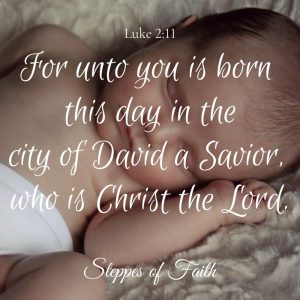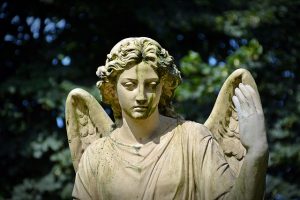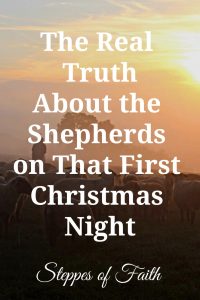
“For unto you is born this day in the city of David a Savior, who is Christ the Lord.” Luke 2:11
There they were, the shepherds, watching their flocks of sheep, protecting them from predators just like any other night of the year. Suddenly, out of nowhere, the angels of heaven appeared to announce the greatest news in the history of the world!
The traditional belief is the shepherds were poor, stinky, and ragtag. But like many stories, sometimes they get spun by culture over time. Yes, they may have been stinky and perhaps a bit disheveled, but they were not poor, country-bumpkin farmers merely scratching out a living. They were much higher up the social ladder than that.
Who were these shepherds? Why did God choose them? A quick look at Jewish priestly duties and a review of Jewish literature explains the truth of that first Noel.
Poor and Dirty Shepherds
Luke 2:8-20 lays out the story for us.
“There were shepherds in the same country staying in the field and keeping watch by night over their flock. Behold, an angel of the Lord stood by them, and the glory of the Lord shone around them, and they were terrified.
“The angel said to them, ‘Don’t be afraid, for behold, I bring you good news of great joy which will be to all the people. For there is born to you today, in David’s city, a Savior, who is Christ the Lord. This is the sign to you: you will find a baby wrapped in strips of cloth, lying in a feeding trough.’
“Suddenly, there was with the angel a multitude of the heavenly army praising God, and saying, ‘Glory to God in the highest, on earth peace, good will toward men.’
“When the angels went away from them into the sky, the shepherds said to one another, ‘Let’s go to Bethlehem, now, and see this thing that has happened which the Lord has made known to us.’
“They came with haste and found both Mary and Joseph, and the baby was lying in the feeding trough. When they saw it, they publicized widely the saying which was spoken to them about this child. All who heard it wondered at the things which were spoken to them by the shepherds. But Mary kept all these sayings, pondering them in her heart.
“The shepherds returned, glorifying and praising God for all the things that they had heard and seen, just as it was told to them.” (WEB)
The usual version we hear about these shepherds is that they were poor and dirty. It’s usually followed up with the idea that Jesus appeared to these poor shepherds because it was God’s design to first appear to “the least of these.” That by appearing to them first, Jesus was conveying His heart to reach the have-nots of society before appearing to any authorities because it was the disenfranchised He was most concerned with.
Well…that’s at least partly true.
Jesus, of course, had (and still has) a heart for those who are downcast and hurting as well as everyone else. But these shepherds, they were hardly outcasts of society. In fact, they were very special people with an extraordinary job.

Mishnah Regulations
The shepherds mentioned in Luke 2 had the unique job of fulfilling Temple duties, and the only ones who could perform Temple duties were priests. We know they were priests because of the Mishnah.
The Mishnah is a group of documents of recorded oral traditions that governed the Jewish people during the time of the Pharisees. One of its regulations states it “expressly forbids the keeping of flocks throughout the land of Israel except in the wilderness—and the only flocks otherwise kept would be those for the Temple services (Bab K.7:7; 80a).
According to Luke 2, these shepherds were in the fields surrounding Bethlehem, not out in the wilderness where regular sheep were kept. They were Temple priests chosen for the specific task of tending Temple sheep.
Why would priests perform menial shepherding duties for the Temple? It is because the sheep were intended to be sacrificed for Passover. It was the priests’ job to make sure the lambs were without blemish and completely unharmed before being sacrificed.
Watching Over Their Flock
Another statement in the Mishnah says that the Messiah would be revealed from the Migdal Eder, which translates as “tower of the flock.” It was an actual tower that stood just outside town and within the Temple priests’ fields. It was a kind of lookout tower.
It was a shepherd priest’s job to stay in the Migdal Eder all night. With the tower being so tall, the shepherd priest was “watching over the flock by night (Luke 2:8)” while the other shepherds were on the ground also keeping watch. (Isn’t it amazing that such a little word can have so much meaning in the Bible?)
The shepherds stayed in the fields continually, yet their service to the Temple priests held great cultural and social significance. But, no matter how you look at it, they were still dirty shepherds tending sheep.
And that’s when the angel showed up with some very good news.

Good Tiding of Great Joy
The belief that the angels appeared first to poor, uneducated, country shepherds makes a lot of sense, but the truth is even better.
Shepherd priests were a part of the animal sacrifice system of the church. It was their job to prepare the sheep for Passover and other Jewish ceremonies. As they tended their duties one night, angels from heaven appeared. They heralded not only the birth of the Messiah, but they also gave an update to Moses’ Law.
In beautiful brilliance, an angel of the Lord hand-delivered a message telling them the time for animal sacrifice was nearly over, and they were the first to know.
“For there is born to you today, in David’s city, a Savior, who is Christ the Lord.” Luke 2:11
The Christ, the promised Messiah the priests had heard about from the prophets, the Savior of the world was finally born. Animal sacrifices were no longer necessary. Jesus would now be the ultimate and perfect sacrifice to pay for man’s sin once and for all through His death and resurrection.
The Messiah had come! It is little wonder these priests ran “with haste (v.16)” to see the baby the angel spoke of.
The Swaddling Cloths
When the shepherds found Mary and Joseph with their new baby, they likely noticed Jesus wrapped in swaddling cloths just as the angel told them (v12). These were not ordinary cloths. They weren’t rags Mary and Joseph brought from home or happened to find in the stable.
The swaddling cloths mentioned in Luke 2:7 are translated as sparganoo (“spar-gan-o-o”) in Greek, which means infant clothes, which leads some to believe the cloths might have been infant clothes borrowed from someone wealthy (perhaps the innkeeper). It was not common for children of poor parents to have anything resembling a diaper or any undergarments. For Mary and Joseph to have any infant clothes to wrap their new baby in would be an indication of Jesus’ royalty, something the shepherds would have quickly noticed.
Theologists speculate the cloths were the same ones used in the Temple to keep lambs clean and free of blemishes as they were prepared for ceremonial sin sacrifices, which the shepherds also would have instantly noticed. The thought is the cloths came from the Temple priest, Zacharias, whose wife, Elizabeth, is Mary’s cousin. Remember, Mary stayed in their house for three months while she was pregnant, and the cloths may have been a sort of baby shower gift. If they were Temple cloths, they would indicate that Jesus would one day be the perfect sacrifice for sin.
How Mary and Joseph got the cloths is unknown. Regardless of whether they were priestly cloths or borrowed cloths from the wealthy, in both cases, they were special wrappings fit for a newborn King of Kings who would one day be sacrificed like a lamb for all mankind.

After the shepherds saw Jesus with their own eyes, the Bible says they “returned, glorifying and praising God for all the things that they had heard and seen (v. 20).” Author Eugene Peterson wrote in his book, The Message, that the shepherds “let loose, glorifying and praising God.”
How wonderful it is to know Jesus the Messiah has come! He is the perfect Lamb, without blemish and sin. And because of His birth, death, and resurrection, we can experience His immense mercy and grace as He covers our sin with His righteousness. May we all glorify and praise Him for His indescribable gift.
He is Immanuel, God with Us.
